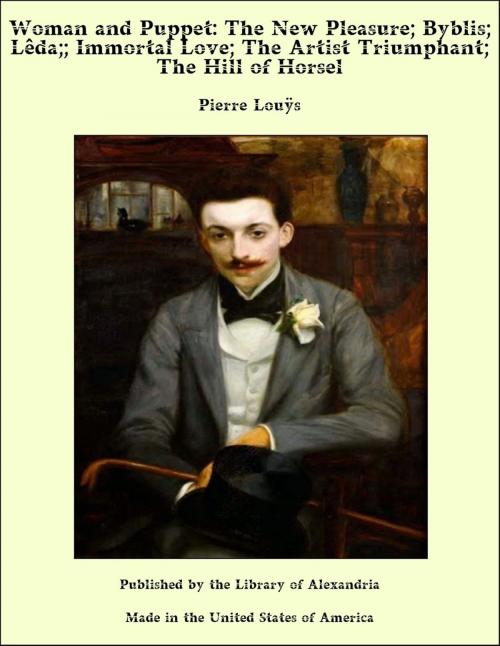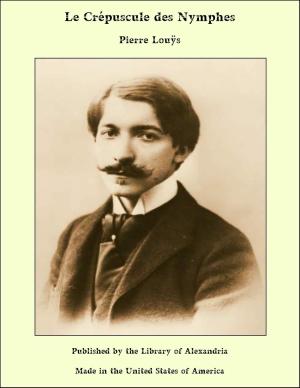Woman and Puppet: The New Pleasure; Byblis; Lêda; Immortal Love; The Artist Triumphant; The Hill of Horsel
Nonfiction, Religion & Spirituality, New Age, History, Fiction & Literature| Author: | Pierre Louÿs | ISBN: | 9781465606723 |
| Publisher: | Library of Alexandria | Publication: | March 8, 2015 |
| Imprint: | Language: | English |
| Author: | Pierre Louÿs |
| ISBN: | 9781465606723 |
| Publisher: | Library of Alexandria |
| Publication: | March 8, 2015 |
| Imprint: | |
| Language: | English |
In Spain the Carnival does not finish, as in France, at eight o’clock on the morning of Ash Wednesday. Over the wonderful gaiety of Seville the memory that “dust we are,” etc., spreads its odour of sepulture for four days only, and the first Sunday of Lent all the Carnival reawakens. It is the Domingo de Pinatas, or the Sunday of Marmites, the Grand Fête. All the populous town has changed its costume, and one sees in the streets rags and tatters of red, blue, green, yellow or rose, that have been mosquito-nets, curtains or women’s garments, all waving in the sunlight and carried by a small body of ragamuffins. The youngsters, noisy, many-coloured and masked, push their way through the crowd of great personages. At the windows one sees pressed forward innumerable brunette heads. Nearly all the young girls of the countryside are in Seville on such a day as this. Paper confetti fall as a coloured rain, fans shade and protect pretty powdered faces, there are cries, appeals and laughter in the narrow streets. A few thousands of people make more noise on this day of Carnival than would the whole of Paris. But, on the twenty-third of February in eighteen hundred and ninety-six, André Stévenol saw the end of the Carnival approaching with a slight feeling of vexation, for the week, although essentially one of love-affairs, had not brought him any new adventure. Some previous sojourning in Spain had taught him with what quickness and freedom of the heart the knots of friendship were tied and untied in this still primitive land. He was depressed at the thought that chance and circumstance had not favoured him. He had had a long paper battle with one young girl. They had fought and teased each other with the serpentine strips of Carnival time, he in the street, she at a window. She ran down and gave him a little red bouquet with “Many thanks, sir.” But, alas! she had fled quickly, and at closer view illusions fled also. André put the flower in his coat, but did not put the giver in his memory. Four o’clock sounded from many clocks. He went by way of the Calle Rodrigo and gained the Delicias, Champs-Elysées of shading trees along the immense Guadalquivir thronged with vessels. It was there that unrolled the Carnival of the elegant. At Seville the leisured class cannot always afford three good meals per day, but would rather go without them than without the outside show of a landau and two fine horses. Seville has hundreds of carriages, often old-fashioned but made beautiful by their horses, and occupied by people of noble race and face. André Stévenol made a way with difficulty through the crowd edging the two sides of the vast dusty avenue. The battle of eggs was on. Eggshells filled with paper confetti were being thrown into the carriages, and thrown back, of course. André filled his pockets with eggs and fought with spirit. The stream of carriages filed past—carriages full of women, lovers, families, children, or friends. The game had lasted an hour when André felt in his pocket his last egg.
In Spain the Carnival does not finish, as in France, at eight o’clock on the morning of Ash Wednesday. Over the wonderful gaiety of Seville the memory that “dust we are,” etc., spreads its odour of sepulture for four days only, and the first Sunday of Lent all the Carnival reawakens. It is the Domingo de Pinatas, or the Sunday of Marmites, the Grand Fête. All the populous town has changed its costume, and one sees in the streets rags and tatters of red, blue, green, yellow or rose, that have been mosquito-nets, curtains or women’s garments, all waving in the sunlight and carried by a small body of ragamuffins. The youngsters, noisy, many-coloured and masked, push their way through the crowd of great personages. At the windows one sees pressed forward innumerable brunette heads. Nearly all the young girls of the countryside are in Seville on such a day as this. Paper confetti fall as a coloured rain, fans shade and protect pretty powdered faces, there are cries, appeals and laughter in the narrow streets. A few thousands of people make more noise on this day of Carnival than would the whole of Paris. But, on the twenty-third of February in eighteen hundred and ninety-six, André Stévenol saw the end of the Carnival approaching with a slight feeling of vexation, for the week, although essentially one of love-affairs, had not brought him any new adventure. Some previous sojourning in Spain had taught him with what quickness and freedom of the heart the knots of friendship were tied and untied in this still primitive land. He was depressed at the thought that chance and circumstance had not favoured him. He had had a long paper battle with one young girl. They had fought and teased each other with the serpentine strips of Carnival time, he in the street, she at a window. She ran down and gave him a little red bouquet with “Many thanks, sir.” But, alas! she had fled quickly, and at closer view illusions fled also. André put the flower in his coat, but did not put the giver in his memory. Four o’clock sounded from many clocks. He went by way of the Calle Rodrigo and gained the Delicias, Champs-Elysées of shading trees along the immense Guadalquivir thronged with vessels. It was there that unrolled the Carnival of the elegant. At Seville the leisured class cannot always afford three good meals per day, but would rather go without them than without the outside show of a landau and two fine horses. Seville has hundreds of carriages, often old-fashioned but made beautiful by their horses, and occupied by people of noble race and face. André Stévenol made a way with difficulty through the crowd edging the two sides of the vast dusty avenue. The battle of eggs was on. Eggshells filled with paper confetti were being thrown into the carriages, and thrown back, of course. André filled his pockets with eggs and fought with spirit. The stream of carriages filed past—carriages full of women, lovers, families, children, or friends. The game had lasted an hour when André felt in his pocket his last egg.















